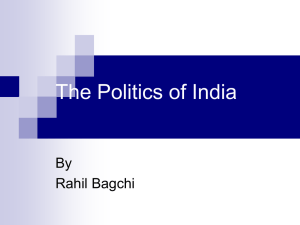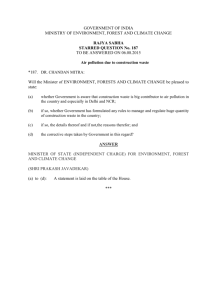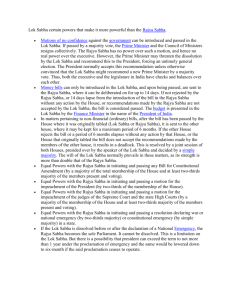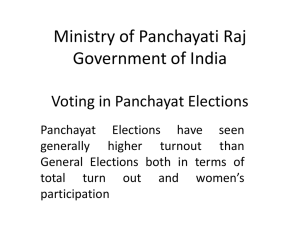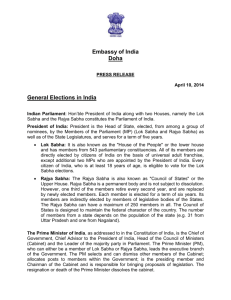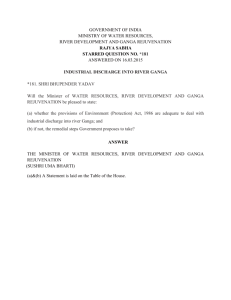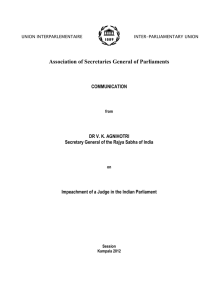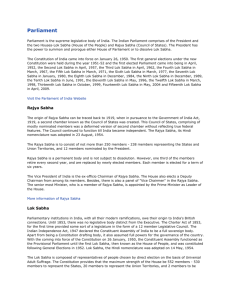RAJYA SABHA 16
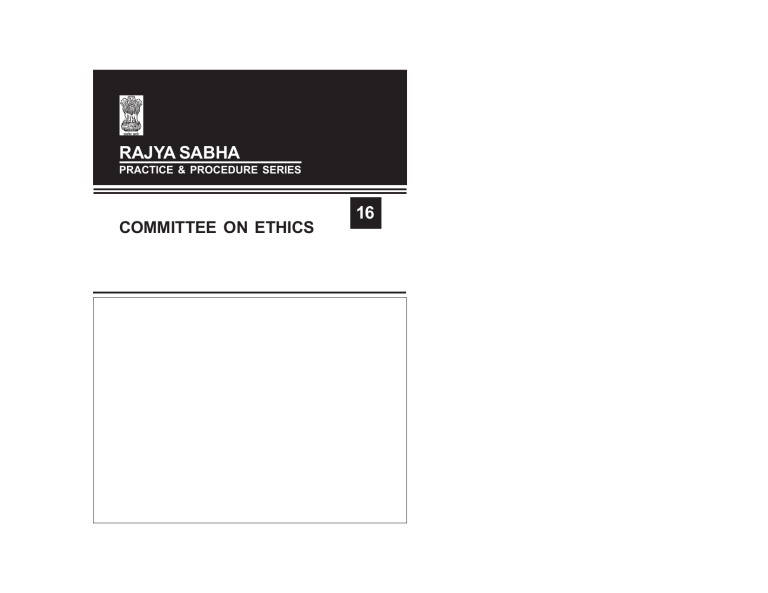
RAJYA SABHA
PRACTICE & PROCEDURE SERIES
COMMITTEE ON ETHICS
16
COMMITTEES ON ETHICS
F. No. RS. 17/5/2005-R & L
© RAJYA SABHA SECRETARIAT, NEW DELHI http://parliamentofindia.nic.in
http://rajyasabha.nic.in
E-mail: rsrlib@sansad.nic.in
RAJYA SABHA SECRETARIAT
NEW DELHI
PUBLISHED BY SECRETARY
-
GENERAL
,
RAJYA SABHA AND PRINTED
BY MANAGER
,
GOVERNMENT OF INDIA PRESS
,
MINTO ROAD
,
NEW DELHI -110002.
PREFACE
This booklet seeks to describe, in brief, the procedure and functioning of the Committee on Ethics of Rajya
Sabha. It is based on the Rules of Procedure and
Conduct of Business in Rajya Sabha, the Members of
Rajya Sabha (Declaration of Assets and Liabilities)
Rules, 2004, and the Reports submitted by the
Committee to the House from time to time.
The booklet is intended to serve only as a handy guide for ready reference and the information contained in it is not exhaustive. For full and authentic information, therefore, original sources may be referred to and relied upon.
New Delhi
February, 2005
DR. YOGENDRA NARAIN
Secretary-General
COMMITTEE ON ETHICS
Introduction
Rajya Sabha has always been alive to the ethical and moral concerns of society. Issues such as corruption in high places, role of black money and other corrupt practices in the elections, have found frequent echoes in the House. Members have emphasized the need for taking urgent steps to tackle these problems especially by effecting comprehensive electoral reforms.
The Government of India appointed in July, 1993 a high level Committee headed by Shri N. N. Vohra, the then Home Secretary, Government of India to take stock of all available information about the activities of crime syndicates/mafia organisations who allegedly had developed links with and were being protected by some
Government functionaries and political personalities. The
Committee in its report pointed out, inter alia, towards a nexus between the criminal gangs, police, bureaucracy and politicians in various parts of the country. It felt that the existing criminal justice system, which was essentially designed to deal with individual offences and crimes, was unable to deal with the activities of mafia.
The provisions of law in regard to economic offences were also found to be weak and there were
1 insurmountable legal difficulties in attaching/confiscating the properties acquired through mafia activities.
The Committee presented its report to the Government of India which laid it before both Houses of Parliament on 1 August, 1995. The report was discussed on 8, 23 and 24 August, 1995 in both the Houses of Parliament.
During the debate, members expressed their concern about the declining standards of behaviour in public life.
One of the suggestions offered at that time was about the setting up of a Parliamentary Committee on Ethics.
Later, an All-Party Meeting under the chairmanship of the then Union Home Minister, late Shri S.B. Chavan, was convened the same year to look into the views expressed and suggestions made by the members in both the Houses. One of the major outcomes of the meeting was the proposal for setting up of a
Parliamentary Committee on Ethics.
Constitution of Ethics Committee in Rajya Sabha
The above suggestion was considered by the General
Purposes Committee of Rajya Sabha in 1997, which decided to have a Committee in regard to the conduct of the members of Rajya Sabha as internal selfregulatory mechanism of the Council itself. The
Committee authorized the Chairman, Rajya Sabha to constitute the Ethics Committee consisting of members of Rajya Sabha.
2
Accordingly, the Ethics Committee of Rajya Sabha consisting of nine members was constituted by the
Chairman, Rajya Sabha on 4 March, 1997, to oversee the moral and ethical conduct of the members and to examine the cases referred to it with reference to the ethical and other misconduct by members. It was, in fact, the first such Committee to be set up by any legislature in India. Subsequently, the strength of the
Committee was raised to ten members.
Members of the Committee including its Chairman, are nominated by the Chairman, Rajya Sabha and they are generally leaders/deputy leaders/whips of their parties in the Rajya Sabha.
Reports of the Committee
The Committee has presented three reports to Rajya
Sabha so far. In its First Report presented to Rajya Sabha on 8 December 1998, the Committee, keeping in view the special needs and circumstances which prevailed in Indian context, recommended a ‘Framework of a Code of Conduct’ which prescribes certain do’s and don’ts for the members of Rajya Sabha. It inter alia include:
(i) Members must not do anything that brings disrepute to the Parliament and affects their credibility.
(ii) Members must utilise their position as
Members of Parliament to advance general wellbeing of the people.
3
(iii) In their dealings if Members find that there is a conflict between their personal interests and the public trust which they hold, they should resolve such a conflict in a manner that their private interests are subordinated to the duty of their public office.
(iv) Members should never expect or accept any fee, remuneration or benefit for a vote given or not given by them on the floor of the House, for introducing a Bill, for moving a resolution or desisting from moving a resolution, putting a question or abstaining from asking a question or participating in the deliberations of the House or a Parliamentary Committee.
(v) Members holding public offices should use public resources in such a manner as may lead to public good.
(vi) If Members are in possession of a confidential information owing to their being Members of
Parliament or Members of Parliamentary
Committees, they should not disclose such information for advancing their personal interests.
(vii) Members should not misuse the facilities and amenities made available to them.
4
(viii) Members should not be disrespectful to any religion and work for the promotion of secular values.
(ix) Members are expected to maintain high standards of morality, dignity, decency and values in public life.
Having laid down a general Framework of a Code of
Conduct for members of Rajya Sabha, the Committee felt the need for providing a procedure for enforcing the code as well as dealing with cases of ethical misconduct by members. In its Second Report presented to Rajya
Sabha on 13 December, 1999, the Committee, therefore, recommended the procedure for making a complaint to the Committee, the mechanism for investigation of a complaint and the question of providing penalties for a proved unethical conduct or for violating the Code. Rajya
Sabha discussed and adopted the first and the second reports of the Committee on 15 December 1999.
In its Third Report presented to Rajya Sabha on
12 August, 2002, the Committee dealt with issues germane to the behaviour of members in the Council as well as outside it. The Committee reiterated that a holistic view had to be taken while dealing with the issues relating to decline in standards of behaviour of the members and that ethical questions could not be dealt with by legislation alone. The Committee, however, felt that the
Code, like in some other Parliaments, could help evolve
5 certain standard norms of behaviour which everyone intending to enter a legislature would be expected to follow. The Committee also emphasized the role of political parties in the electoral process and called upon the people not to elect persons with “dubious distinction” to legislative bodies. It emphasized the urgency to bring about the much desired though delayed electoral reforms for cleansing public life.
The Committee expressed its serious concern over the increasing trend of disorderly proceedings in legislatures. It called upon the Government as well as the Opposition to be aware of their joint responsibility to the people of this country to ensure that proceedings in the Council are conducted uninterruptedly, in accordance with the rules, established procedures and conventions of the Council. The Report was adopted by the House on 9 December, 2003.
The Committee in its Fourth Report presented to
Rajya Sabha on 14 March, 2005, has recommended five pecuniary interests pertaining to which information may be furnished by Members for Registration of
Interests in the Register of Members’ Interests as provided in Rule 293 of the Rules of Procedure. These five pecuniary interests would be: remunerative directorship; regular remunerated activity; shareholding of controlling nature; paid consultancy; and professional engagement. The Report of the Committee was adopted by the House on 20 April, 2005.
6
Rules relating to Committee on Ethics
Rules relating to the Committee on Ethics came into force w.e.f. 20 July, 2004. Rules relating to Declaration of the Assets and Liabilities under the Representation of the People (Third Amendment) Act, 2002 came into force w.e.f. 5 August, 2004. Rule 292 of the Rules of
Procedure and Conduct of Business in the Council of
States provides the link between the two above mentioned Rules. Chapter XXIV consisting of Rules
286-303 were added to the Rules of Procedure and
Conduct of Business in the Council of States w.e.f.
20 July, 2004. Under Rule 292 of the Rules of Procedure and Conduct of Business in the Council of States every member shall be required to furnish information within ninety days of his making and subscribing an oath or affirmation under Article 99 of the Constitution, relating to his own assets and liabilities as well as the assets of his immediate family members, namely, spouse, dependent daughters and dependent sons, as provided in the rules framed under Section 75A of the
Representation of the People (Third Amendment) Act, 2002.
Functions of the Committee
Under Rule 290, the Committee has the following functions:
(a) to oversee the moral and ethical conduct of members;
7
(b) to prepare a Code of Conduct for members and to suggest amendments or additions to the
Code from time to time in the form of reports to the Council;
(c) to examine cases concerning the alleged breach of the Code of Conduct by members as also cases concerning allegations of any other ethical misconduct of members; and
(d) to tender advice to members from time to time on questions involving ethical standards either suo motu or on receiving specific requests.
Rule 297 of the Rules of Procedure and Conduct of
Business in the Council of States provides that where it has been found that a member has indulged in unethical behaviour or that there is other misconduct or that the member has contravened the Code/Rules, the
Committee may recommend the imposition of one or more of the following sanctions viz:
(a) censure;
(b) reprimand;
(c) suspension from the Council for a specific period; and
(d) any other sanction determined by the
Committee to be appropriate.
8
The Members of Rajya Sabha (Declaration of Assets and Liabilities) Rules, 2004
The Members of Rajya Sabha (Declaration of Assets and Liabilities) Rules, 2004 framed by the Chairman,
Council of States under sub-section (3) of Section 75A of the Representation of the People (Third Amendment)
Act, 2002 came into effect on 5 August, 2004 and were notified in the Gazette of India on the same date for information of general public. The Rules were also published in the Bulleting Part II of the Council for the information of its Members.
Under Rule 3 of the Members of the Rajya Sabha
(Declaration of Assets and Liabilities) Rules, 2004, every elected member of the Council is required to furnish as in FormI the following information to the Chairman, Rajya
Sabha within 90 days from the date of his taking oath/ affirmation:—
(a) the movable and immovable property of which he, his spouse and his dependent children are jointly or severally owners or beneficiaries;
(b) his liabilities to any public financial institution; and
(c) his liabilities to the Central Government or to the State Governments.
Under Rule 4 of the said rules, the Secretary-General shall maintain a register to be called the Register of
9
Declaration of Assets and Liabilities of Members as in
Form-II. The information contained in the Register shall be made available to any person with the written permission of the Chairman. Though the Representation of People (Third Amendment) Act, 2002 came into force through an Ordinance w.e.f. 24 August, 2002 but the rules thereunder could be framed and enforced only on
5 August, 2004. In the intervening period there were
Members who had been got elected and taken oath between 24 August, 2002 and 5 August, 2004. The period of ninety days for furnishing declarations after taking oath/affirmation by them had therefore already expired.
In order to take care of such Members, the Chairman,
Rajya Sabha decided that the Members who had been elected after 24 August, 2002 may furnish declarations regarding their assets and liabilities within 90 days from
5 August, 2004, i.e. the date of enforcement of the relevant rules.
Instances of contravention of the rules shall be brought in the form of a complaint in writing, to the Chairman of the Council by any other member or a citizen of India.
The complaint shall be supported by documentary evidence, if any. The complainant will submit an affidavit to ensure that the complaint is not false, frivolous or vexatious and it is made in good faith. The complaint will not be entertained if it is not made as per the requirement of the rules. If the complaint complies with the requirements as laid down in the rules, it will be
10
sent to the Members against whom complaint has been received for obtaining his comments. After considering his comments, the Chairman may either reject the complaint or forward it to the Committee of Privileges for making an inquiry and report. If the Committee of
Privileges does not find any wilful contravention of these rules, the matter may be closed. Otherwise, findings of the Committee are laid before the House in the form of a report for a decision on the recommendations contained therein.
11
